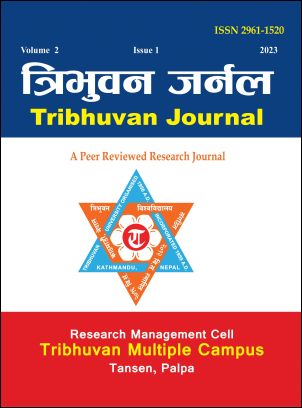EMI Strategy: A Misconception in Early Grade
DOI:
https://doi.org/10.3126/tribj.v2i1.60260Keywords:
EMI, English hegemony, symbolic violence, socially responsive pedagogy, instructionAbstract
This article discusses on the debatable EMI (English as a Medium of Instruction) issue as there is confusion either English must be taught right from the Nursery or at some later stage. Nepalese classrooms are the product of multilingual, multicultural and bilingual society. Without considering the fact of multilingual and multi-ethnic context, EMI (English as a medium of Instruction) is strictly adopted in schools in early grade. Our school system, including textbooks, instruction, curriculum, teaching practices, is influenced heavily by the dominant English hegemony in early grade. In this context, this paper aims to explore the difficulties and struggles of Nepali language speaking children’s experiences as they find in between the Nepali-speaking home environment and English-speaking school environment at their early grades. To fulfill this objective, the researcher adopted narrative research design under qualitative method incorporating interpretative philosophical guideline. It is based on the unstructured interviews aimed at eliciting personal stories and experiences related to EMI in early grade. Discussing on a narrative analysis, this paper revealed that how the learners are discouraged to what Bourdieu’s term symbolic violence with some examples of how such demotivation is seen in school’s teaching-learning practices. The results further concluded that to address the problematic nature of schooling for such learners in most of the schools in Nepal, this paper highlights the need for socially responsive school policies and pedagogy understanding local context entertaining the linguistic and cultural diversity of students.




